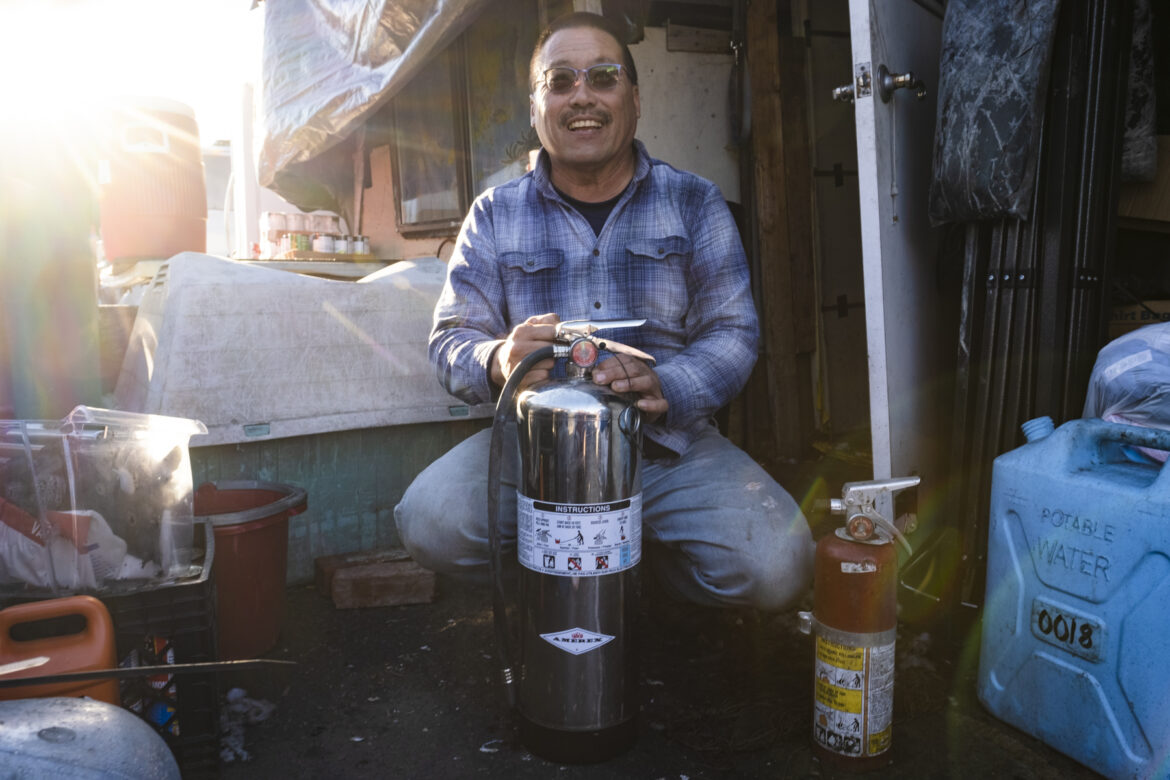Tucked away on a dead-end street a few blocks from Ring Central Coliseum in East Oakland sits a curbside community whose residents call themselves the 77th Avenue Rangers. The cul-de-sac is home to 14 temporary dwellings, from trailers to tents and makeshift structures, providing shelter to about 20 people.
As encampment fires spiked in Oakland and San Francisco during the first year of the pandemic, they fell by half in the Rangers community to just six. One reason for the disparity? The Rangers beefed up fire precautions. The community’s last tent fire occurred 18 months ago, and when a vehicle caught fire in December 2021, residents were prepared. They used fire extinguishers to put out the blaze.
A mother of three who was caught under a freeway overpass in San Francisco’s Glen Park neighborhood didn’t have the good fortune to live in a community with the Rangers’ tools and preparation. A February fire killed her and severely injured three others.
Encampment fires are a fact of life due to the exposed conditions unhoused residents live in, and have led to painful consequences for residents of encampments like the pair of sites along a freeway exit in Berkeley known as Seabreeze, who were removed by state officials last summer after a series of fires. But the Rangers’ camp demonstrates that there’s hope for controlling these incidents without official intervention. The key to their success has been fire preparedness, including measures like installing smoke alarms and keeping fire extinguishers on hand, according to Derrick Soo, leader of the Rangers community.
“Fire safety measures are a necessity, including at encampments, because every human life is valuable,” said Paul-Kealoha Blake, a member of Berkeley’s Homeless Commission and a volunteer with the nonprofit Consider the Homeless! “Encampment fires are an issue because they endanger both the resident of the structure that’s on fire and endangers the encampment.”
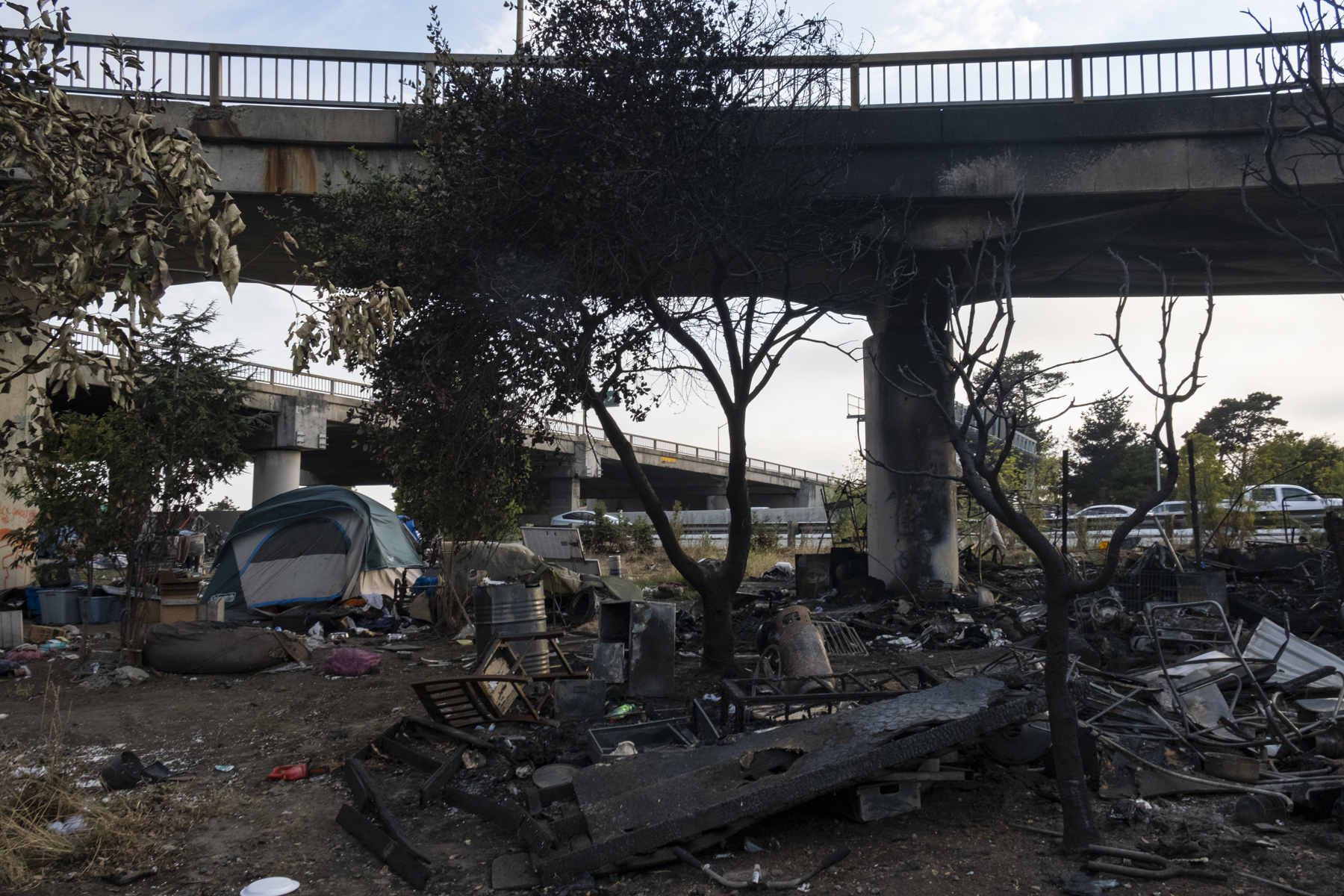
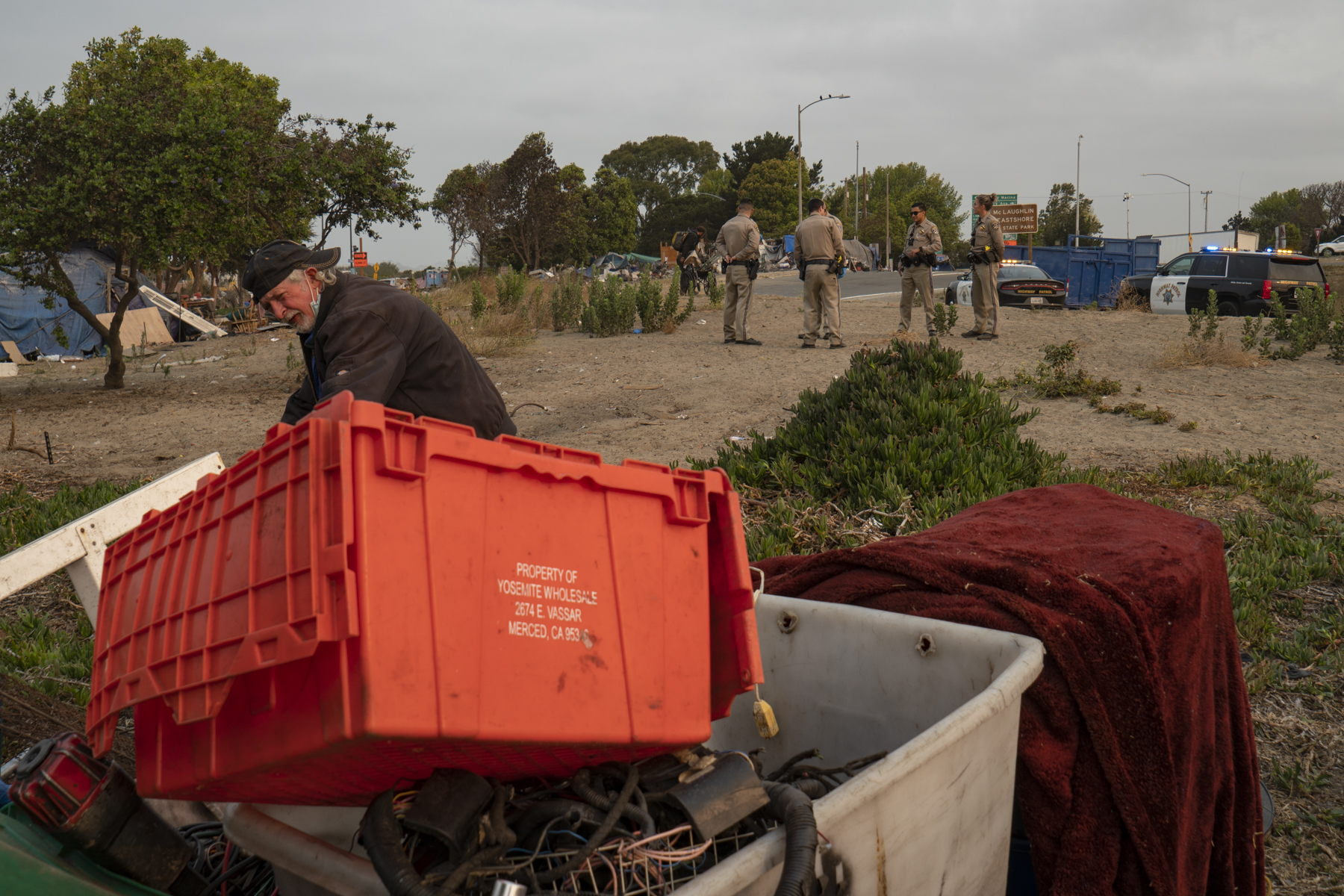


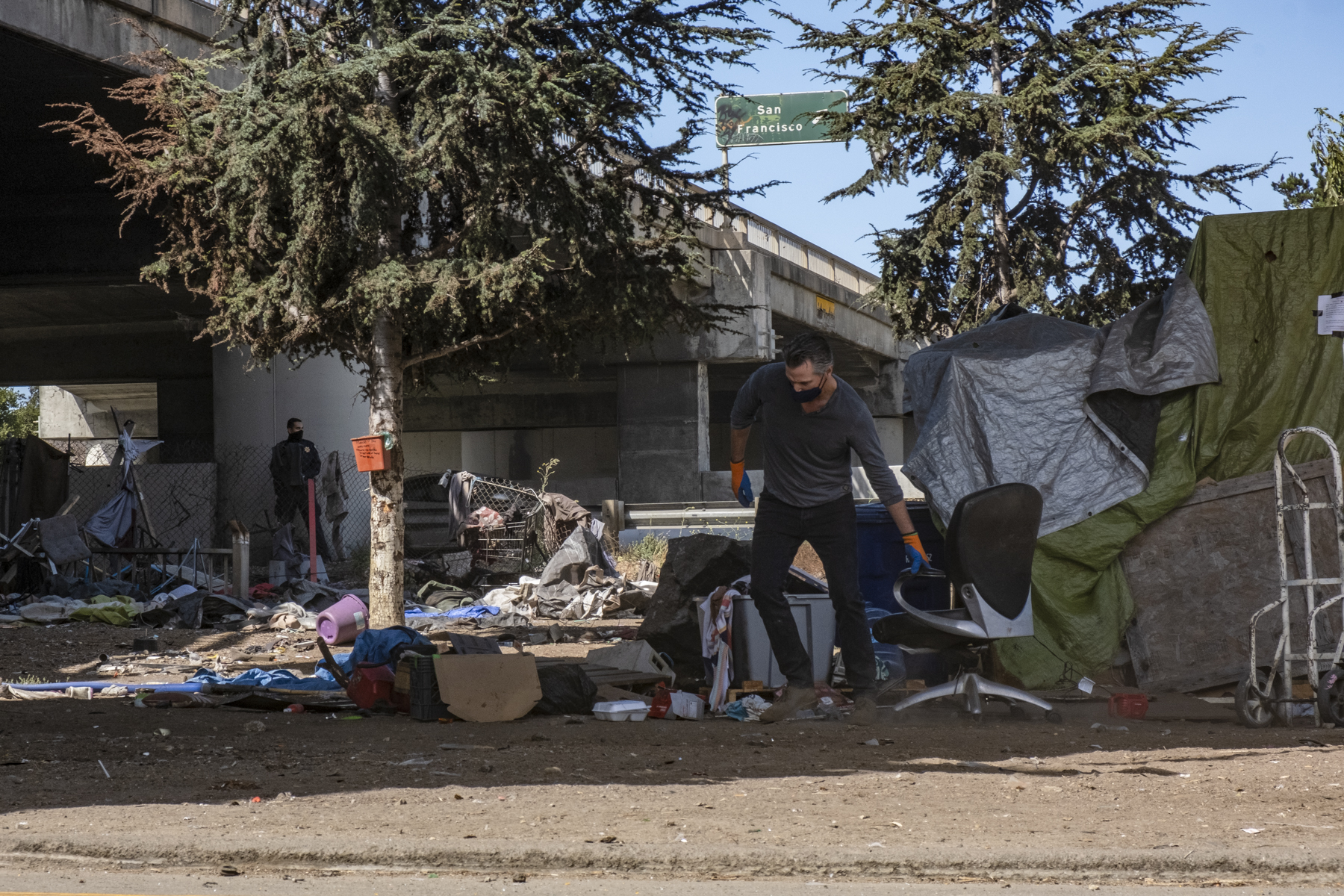
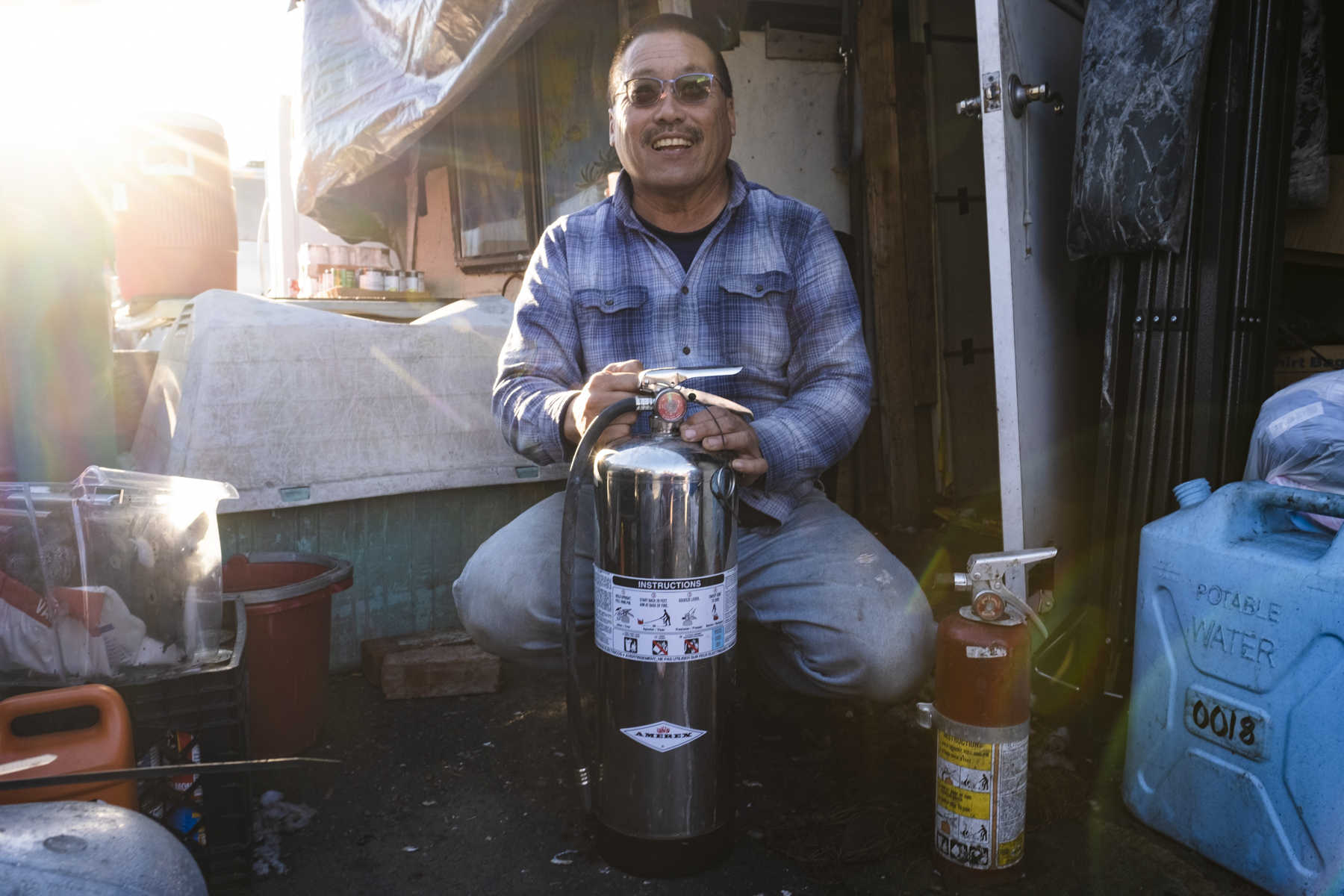

About a year ago, former Berkeley councilmember Cheryl Davila pushed to create an official program to address encampment fires. Davila proposed using existing homeless services funding to distribute fire extinguishers and fire prevention tools through social service providers. The City Council tabled the proposal in March 2021.
Fire preparedness is essential “to protect the safety of our people and preemptively stop the spread of preventable fires,” said Davila in a report to the council last year.
As an example of work the city could build on, she pointed to outreach done by residents and homeless advocacy nonprofits that have distributed chemical fire extinguishers to people living in tents and vehicles.
Those tools might have helped residents of a large Wood Street encampment in Oakland, where multiple vehicles caught fire on March 1, including an RV. Within a week, another encampment less than a mile away also went up in flames. Fires increased 14% in Oakland during the first year of the pandemic to 611 from the previous year’s 535, tent encampment fires are projected to decline slightly in the second year.
During the first year of the pandemic, fire incidents associated with homeless encampments in Berkeley rose at a similar rate, climbing 18% to 133 from 113 the previous year. About a third of those fires were at the Seabreeze Camp on the Interstate 80 University Avenue exit, where passersby reported smoke, cooking, trash fires and tent fires.
Residents at the Seabreeze camp used extinguishers to control some of their fires, but each time one was used, it had to be replaced or refilled, which made it difficult for volunteers to abate all fires without support from the city.
In this camp and many other locations, residents approach fires differently than the Rangers.
On the edge of the freeway
On a cold, windy evening at Seabreeze Camp, Mama West looked for spare poles to fix her sleeping quarters and prevent her tent from blowing away.
For the past six years, Mama West lived on this strip of land along the University Avenue freeway exit in Berkeley. Residents and advocates named the community after a nearby market. Seabreeze is also an apt descriptor: The winds can reach 30 miles per hour here near the Berkeley Marina, and fire is a necessity to maintain warmth.
As the sun set, her partner, Drew, got ready to start a blaze in their fire pit, a metal tub wide and high enough to shield a sizable bonfire. He found fuel from a neighbor, Shawna, who keeps stacks of chopped-up pallets in front of her tent.
In early July 2021, the Seabreeze Camp was scheduled to be dismantled by Caltrans due to the growing issues with trash and fires. Berkeley city staff also cited problems like crime and domestic disputes.
On Aug. 9, Gov. Gavin Newsom joined the transportation agency staff in clearing part of the encampment before holding a briefing on his California Comeback Plan, which dedicates $12 billion to housing, shelter and services for people experiencing homelessness, plus $50 million for local governments to resolve encampments.
After the cleanup at the “downstairs” section of Seabreeze where people camped under the freeway, “11 residents accepted services,” said Will Arnold, a spokesman for Caltrans. Several others were displaced onto city streets without securing housing services.
A week later, when the Seabreeze “upstairs” cleanup took place, another 17 residents who lived on the islands along the University exit and Frontage Road had nowhere to go. They relocated to city sidewalks and a nearby freeway exit. About two dozen, including Mama West, moved into hotel rooms through Project Roomkey, which places unhoused residents in hotels. Two people accepted a four-person tent at the 24-hour Horizon Transitional Village shelter, according to a Berkeleyside report and a reporter’s visit to the indoor tent site.
Those who declined shelter beds pointed to bans on guests, pets, cooking and substance use. In addition, they said, showers are available only twice a week and lights stay on all the time. “Several people have turned down Horizon because their outside tents are bigger than the indoor tent that sits on the concrete floor inside,” wrote activist and civil rights attorney Andrea Henson in an email. “For some with severe disabilities and chronic pain this makes a difference.”
A civil rights lawsuit filed against Caltrans in August on behalf of Seabreeze encampment charged that some “did not receive any offer of housing at all” and others “had disabilities that prevented them from accessing alternative shelter.” The plaintiffs won a preliminary injunction allowing them to remain at the former Shellmound camp, located at the Ashby freeway exit, for six months. Caltrans has appealed. On March 23, the injunction is set to expire, and another hearing is scheduled to determine a four-month extension. Plaintiffs also ask to return to the Seabreeze camp, saying it’s a safer and more accessible location to connect remaining residents to housing services.
Mitigating fire risk
After gathering fuel, Drew loaded the fire pit with wood scraps and a Burger King bag filled with cardboard clamshell containers and paper wrappers. His torch lighter ignited the flames, and he placed a metal rack with an empty skillet on top. But he forgot the water he intended to boil, and stepped into the darkness of the tent, searching for a water jug.
“Do not leave your skillet unattended without water!” yelled Mama West when she spotted the pan. She threw it in the sand and covered the fire pit with the skeleton of a metal chair, protecting other items from coming close to the open flames.
In 2021, Mama West’s tent has caught fire three times as winds spread the flames from fires set by neighbors for cooking and warmth. Once, a small barbecue grill was knocked from the cooking table.
About a month before this dinner, Mama West lost one of her puppies in a tent fire that began while she stepped outside to make a cup of tea in her fire pit. Suddenly, smoke poured from her tent, and she dashed inside to rescue her six puppies and adult dog. She doesn’t know what set the tent ablaze.
The greatest loss for her was not her personal identification documents and other belongings, but her dog Patches and the puppies she considered “grandbabies.” Berkeley’s Animal Control put her dogs up for adoption and charged Mama West with animal endangerment in the death of her puppy. She fought to get the charge dropped, but her animals were not returned.
Seabreeze Camp residents successfully fought for years against Caltrans efforts to clear the parcel where they lived, but their eventual displacement felt inevitable. The agency’s policy calls for evicting residents immediately when encampments pose an imminent threat to safety or relocating them over a longer timeline when the risk is high but not critical.
“Immediate threats include modifications to structures that increase the risk of collapse, encampments that physically block traffic or pathways and put people in the encampments or the traveling public at risk of imminent danger,” Hector Chichilla, a Caltrans spokesman, wrote in an email, adding that fire risk may also fall under this category.
The pandemic put a crimp in the encampment removal policy. Cleanups fell to less than a quarter of their pre-pandemic numbers in 2020 before rebounding in 2021.
In Berkeley, the most common fire calls associated with unhoused individuals and encampments are survival-related fires — those used for cooking and warming — the notes in Berkeley Fire Department reports show. Warming fires almost doubled to 35 during the first year of the pandemic, while cooking fires fell by about half to 33. Advocates and homeless communities concerned about fires say the city could do more to help them, especially given its efforts elsewhere.
The Berkeley Fire Department has often made donations of surplus equipment and vehicles to residents in need in countries as far afield as Argentina and South Africa. They have also donated locally, helping the Berkeley School District, Berkeley Boosters Association and the Northern California city of McCloud.
Berkeley does run an emergency weather shelter, but by December 2021, it was at capacity, hosting only 19 residents due to COVID-19 restrictions. In late January, the city also relocated 27 unhoused people to hotel rooms at the Berkeley Inn through a special winter housing program, but less than a month later, almost all were returned to the streets, where temperatures dropped below 40 degrees. Many lacked tents, as their property was seized during sweeps Jan. 26 and Feb. 1.
“We don’t have enough shelter space,” said Blake of the homeless commission. “It’s all full. And the Horizon shelter has no heat.”
Dinner al fresco
As the moon lit up the night sky above their tent, Drew returned with a clear jug and put the skillet back on the fire rack, boiling water for soup with instant noodles. Mama West heated a foil plate of prepared rice, broccoli and teriyaki chicken from a homeless-services nonprofit.
While the food warmed up, Mama West stashed her groceries from weekly donations in the mended tent to keep them safe from rats. Plastic bags and bins filled half the tent, leaving the edge of the mattress open for the two to sit. After she and Drew reorganized the food bins, Mama West put her prized keyboard back inside. She loves making music.
With the food secured, dinner was ready. They sat on the mattress and laid out dishes to share on top of their metal ice chest. Mama West dug into the chicken teriyaki plate with her fingers and Drew slurped his chicken noodles, watching the fire crackle.
Fire prevention: community solutions
In deep East Oakland, leader Derick Soo set up a fire safety system for the 77th Avenue Rangers and advocated for temporary access to a nearby fire hydrant. Kyle Mitchell, a lawyer and Soo’s friend, helped out.
Mitchell has purchased fire suppression tools for the Rangers like extinguishers, alarms, Thermoses and power banks. The power banks allow people to charge devices and provide light, so residents can avoid the danger of open flames or wildcat hookups to electricity poles. He also distributed 20-gallon jugs of water to unhoused residents throughout Oakland, and advocated for water access at encampments to become an official city program.
For fire suppression, smoke detectors are effective, and with 10-year batteries, will last a long time. Because fire extinguishers are expensive to buy and refill, Mitchell taught unhoused residents how to cheaply refill them with pressurized water and soap. They can be refilled at gas stations or with a bicycle pump, but they are heavy – and this soap-and-water mixture won’t work on electrical or gas fires, although those incidents rarely occur at encampments due to their lack of amenities.
Soo uses a power solar grid that holds 4,000 watts with eight batteries, and a diesel generator for extra power to charge residents’ devices and two community refrigerators at night. Diesel is much less flammable than gasoline.
For heat, camp residents use gadgets fueled by propane because the power required to generate heat is more than any power bank or individual solar grid can provide. Propane is portable, abundant and long-lasting compared to other alternatives.
Fire prevention tools are distributed to Oakland residents living in homes and apartments, but on the streets, unhoused residents are responsible for devising their own solutions. Nonprofits and volunteers like Mitchell work to bridge that gap and distribute these much-needed essentials.
These tools can make a difference, especially when it’s cold. During the pandemic, fire incidents surged in winter, when temperatures dropped. Oakland averaged about 70 fires per month from November 2020 to March 2021, compared with 58 a year earlier. In 2021, fires continued to climb, spiking to 99 in March –– the highest monthly incident rate in the last three years.
The numbers are likely an underestimate, as Oakland Fire Department reports showed only encampment fires, not trash fires, vehicle fires, or other types of fires connected to unhoused residents.
Camp residents have identified several affordable tools and other alternatives for safe heating, like a portable propane heater that turns off when tipped over, or a diesel air heater. Soo heats his home with a turkey air fryer running on a small propane tank that can last him a month, but it costs him a whopping 60% more than a year ago.
Soo used to pay $15 for a 20-pound refill. Now he pays $24. The coronavirus pandemic increased demand for outdoor activities and recreational camping, and portable propane tanks were also often out of stock. Other options when propane is not available and money is tight are bottles filled with hot water or heated stones, according to Mitchell.
Soo has experimented with fire retardant paint on fabric and plywood surfaces. But even with these modifications, tents are not very resistant to any of the elements.
“Typically, here on this street, tents last about two months because of the wind,” said Soo. “Wind just tears them up. Tents don’t hold very well even when you put tarps on them.”
Because of tents’ minimal weather protection and lack of security, Soo is designing Conestoga huts for the Rangers. These tiny homes, which look like the back of a covered wagon, will be built on a platform and have electricity, hot water, windows, showers and a mini kitchen. Each home has a water tank and infrared water heater. The rounded roof/wall uses plastic for waterproofing and tar paper for fire resistance under a heavy-duty tarp.
While these homes can be a solution to providing safe shelter, they are still temporary. Since 2016, Soo has been advocating for the sanctioning of his camp, and he also helps camp residents get connected to housing services. By March, the occupancy of the camp had dwindled down to half, and the city canceled their mobile shower service. But this has not defeated him, and Soo built a solar shower.
“Camps are a necessity because some folks have only known violent streets,” said Soo. “People don’t know a village community.”
